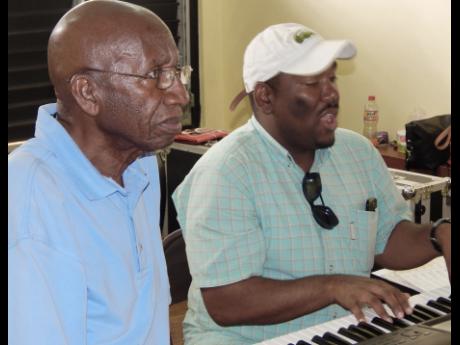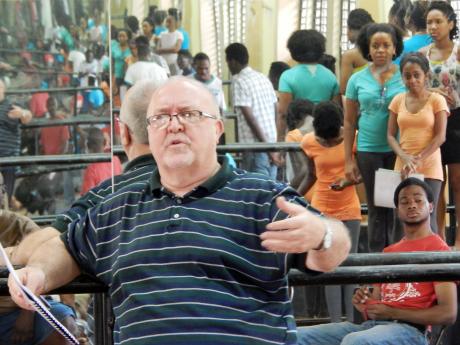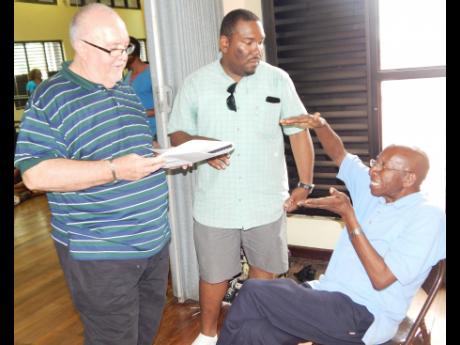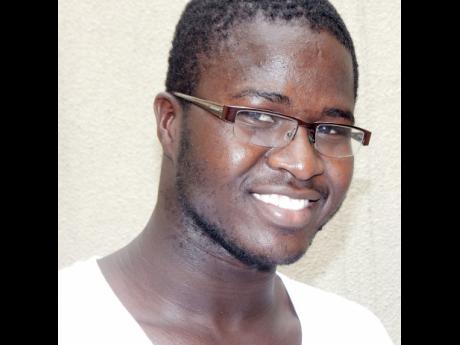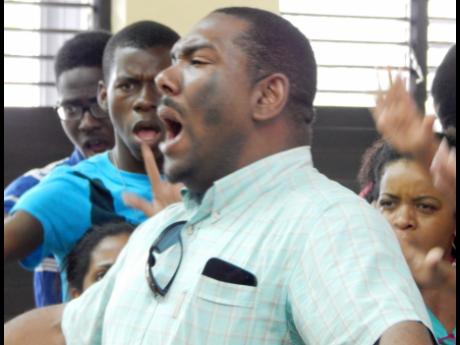First full-length Jamaican opera opens tomorrow
Following a year of composition and months of rehearsals, Jamaica's first full-length opera opens tomorrow at the Philip Sherlock Centre for the Creative Arts (PSCCA), Mona. The opera, 1865, with words and music by Franklin Halliburton, is based on historical events surrounding the Morant Bay Rebellion 150 years ago.
I spent a couple of hours at what was scheduled to be a six-hour long rehearsal last Saturday. Most audiences only see the finished product, but the creation process is quite fascinating.
Script in hand, the director, Dr Brian Heap, spent most of the time in front of the cast explaining sections of the story and how he wanted lines played and sung, and from what stage positions. Most, if not all, the performers were members of the University Singers (which Halliburton leads) and all were shoeless, for the rehearsal was taking place on the silk-smooth floor of the PSCCA's dance studio, not in the theatre where the production will be staged.
Halliburton was the busiest of the roughly 40 men and women present, acting both as the show's musical director and a performer. He plays National Hero George William Gordon.
For a while, Halliburton would be at the keyboard just offstage, both accompanying instrumentally and singing along with the cast; then he would dash onstage to take instructions for a few minutes from Heap about the best interpretation of lines he himself had written. Then it would be back to the keyboard.
Occasionally he - sometimes along with Heap - would confer with the show's music consultant, Noel Dexter, a former musical director of the Singers. Occasionally, too, he would speak with his energetic seven-year-old daughter, who, he claims, is a reliable judge of the opera tunes. During a long break in the rehearsals, he was able to speak to me.
"Of all the hats I wear," he said, "including librettist, composer and musical director, the most challenging is my role of George William Gordon. I had not planned on playing it, and wrote it for a high, dramatic tenor. I am, at best, a high baritone."
Fortunately or unfortunately, all the singers he wanted were otherwise occupied and, he shrugged, "The show must go on."
Asked if the opera is a challenge for the cast as well, he replied, "I am purely the conduit through which this work has come. I didn't write it to challenge anyone, but it happened that way.
"I recognise in hindsight that I have written it to heighten the drama in certain areas and it does stretch the Singers. It takes them to their vocal limit. Opera takes you through a wide range of emotions, and your entire being is engaged. You have to tap into resources you don't ordinarily need."
From the audience's point of view, he continued, the work will prove "a musical and dramatic challenge." He explained: "Our audiences have been accustomed to seeing us in choral theatre [singing with a bit of acting], but this is a different kettle of fish. We've never done this before."
He was referring to the scope of the two-and-a-half-hour show, for in University Singers' 2012 season, the Halliburton-Heap-Dexter team had the choir present the original 25-minute-long version of 1865. For the current expanded version, PSCCA Tutor Coordinator Michael Holgate is assistant director.
I asked Hallilburton for a summary of the story.
"There are two factions," he said, "the peasant folk, recently freed slaves, and the gentry, the plantocracy. The peasants, having left the plantation, are trying their hand at subsistence farming, but they have no right to land ownership. They are disposed and displaced. The plantocracy are the oppressors. That's the backdrop."
The action shows the custos of St Thomas in the East trying to break up a gathering of peasants at an Underhill meeting. [Those meetings followed the publication of a letter showing sympathy for the oppressive conditions of the peasants written by Baptist Missionary Secretary Dr Edward Underhill to the Secretary of State for the Colonies].
The custos is chased from the meeting. The peasants want the intervention of Jamaica Assembly member George William Gordon, a man they see as a saviour.
After an intimate scene with his wife, Gordon delivers a famous and fiery speech against Governor Eyre and the harsh system under which the peasants live. Gordon is chased out of the Assembly.
While the peasants are conducting a ritual linking them to their African roots, Halliburton continued, the news comes that an unfair trial of one of their folk has taken place in Morant Bay. Bogle whips up the crowd and marches them into Morant Bay. They confront the custos at the Court house and he reads the Riot Act. A melee occurs and the peasants burn down the courthouse.
strength of the nation
"We try to wrap things up there," Halliburton said, explaining that though the hanging of Bogle and Gordon is sung about, the opera ends in a triumphal chorus where the gentry and plantocracy come together and sing about the strength of the nation.
Naming the other lead characters, Halliburton said that Paul Bogle is played by O'Neil Jones (who has come back from Alcorn State University to reprise the role he played in the original) and Anthony Alexander, as an alternate. The custos rotolorum is played by Dr Sean Moncrieffe, a senior tenor in the choir. Mary Jane Gordon and Lady Sofie, the wife of the custos, will be played by Ana Strachan and Nomali Lumsden, who will switch roles on various nights. The narrator is tenor Roy Thompson.
Halliburton laughed when I asked him how he managed to find time to work at both his law practice and the opera, and he confessed that while in court waiting on a matter to come up, he had found himself writing bits of the libretto.
"In my day job," he continued, "I encounter many principles of the law that twist up my mind, but when I sit to write around my piano or come here to rehearse, it is cathartic. It keeps me sane."
By the way, music lovers may remember that, in 2012, Dr Andrew Marshall, assistant professor of music at Northern Caribbean University in Mandeville and founder-director of the annual Jamaica Choral Scholars' Festival, staged his one-act opera Hardtalk, which is about the May 2010 Tivoli incursion.
Related news is that eminent British composer Dr Shirley J. Thompson, who was born in London of Jamaican parents, will be staging her opera Sacred Mountain: Episodes in the life of Queen Nanny of the Maroons at Tête à Tête: The Opera Festival in London in July. That festival is the largest contemporary opera festival in Europe.

